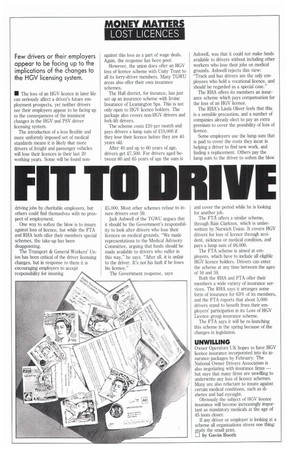FTT
Page 26

If you've noticed an error in this article please click here to report it so we can fix it.
Few drivers or their employers appear to be facing up to the implications of the changes to the HGV licensing system.
• The loss of an HGV licence in later life can seriously affect a driver's future employment prospects, yet neither drivers nor their employers appear to be facing up to the consequences of the imminent changes in the HGV and PSV driver licensing system.
The introduction of a less flexible and more uniformly imposed set of medical standards means it is likely that more drivers of freight and passenger vehicles will lose their licences in their last 20 working yeats. Some will be found non
driving jobs by charitable employers, but others could find themselves with no prospect of employment.
One way to soften the blow is to insure against loss of licence, but while the FTA and RHA both offer their members special schemes, the take-up has been disappointing.
The Transport & General Workers' Union has been critical of the driver licensing changes, but in response to them it is encouraging employers to accept responsibility for insuring against this loss as a part of wage deals. Again, the response has been poor.
However, the union does offer an HGV loss of licence scheme with Unity Trust to all its lorry-driver members. Many TGWU areas also offer their own insurance schemes.
The Hull district, for instance, has just set up an insurance scheme with Irvine Insurance of Leamington Spa. This is not only open to HGV licence holders. The package also covers non-HGV drivers and fork-lift drivers.
The scheme costs 210 per month and pays drivers a lump sum of 210,000 if they lose their licence before they are 40 years old.
After 40 and up to 60 years of age, drivers get 27,500. For drivers aged between 60 and 65 years of age the sum is 25,000. Most other schemes refuse to insure drivers over 59.
Jack Ashwell of the TGWU argues that it should be the Government's responsibility to look after drivers who lose their licences on medical grounds. "We made representations to the Medical Advisory Committee, arguing that funds should be made available to drivers who suffer in this way," he says. "After all, it is unfair to the driver. It's not his fault if he loses his licence."
The Government response, says Ashwell, was that it could not make funds available to drivers without including other workers who lose their jobs on medical grounds. Ashwell rejects this view: "Truck and bus drivers are the only employees who hold a vocational licence, and should be regarded as a special case."
The RHA offers its members an insurance scheme which pays compensation for the loss of an HGV licence.
The RHA's Linda Oliver feels that this is a sensible precaution, and a number of companies already elect to pay an extra premium to cover the possibility of loss of licence.
Some employers use the lump sum that is paid to cover the costs they incur in helping a driver to find new work, and finding a replacement. Others pay the lump sum to the driver to soften the blow and cover the period while he is looking for another job.
The FTA offers a similar scheme, through Bain Clarkson, which is underwritten by Norwich Union. It covers HGV drivers for loss of licence through accident, sickness or medical condition, and pays a lump sum of 26,000.
The FTA scheme is aimed at employers, which have to include all eligible HGV licence holders. Drivers can enter the scheme at any time between the ages of 16 and 59.
Both the RHA and FTA offer their members a wide variety of insurance services. The RHA says it arranges some form of insurance for 63% of its members, and the FTA reports that about 5,000 drivers stand to benefit from their employers' participation in its Loss of HGV Licence group insurance scheme.
The FTA says it will be re-launching this scheme in the spring because of the changes in legislation.
UNWILLING
Owner Operators UK hopes to have HGV licence insurance incorporated into its insurance packages by February. The National Owner Drivers Association is also negotiating with insurance firms — but says that many firms are unwilling to underwrite any loss of licence schemes. Many are also reluctant to insure against certain medical conditions, such as diabetes and bad eyesight.
Obviously the subject of HGV licence insurance will become increasingly important as mandatory medicals at the age of 45 loom closer.
If any driver or employer is looking at a scheme all organisations stress one thing: study the small print.
0 by Gavin Booth












































































































